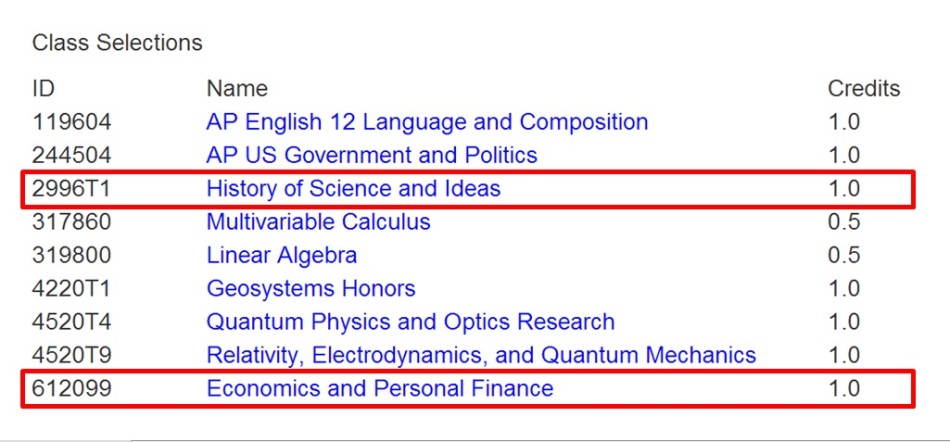Restrictions on fulfilling graduation requirements affect student course selections
Students in the Class of 2015 and beyond may need to adjust their four-year plans due to restrictions on taking an eighth academic course.
February 16, 2014
As the course selection process begins for the 2014-2015 school year, several students have found their four-year plans disrupted by constraints on the ways in which they can fulfill graduation requirements.
Rising seniors in the Class of 2015 will no longer be allowed to take graduation requirements as an eighth academic course online. The rationale for this rule is that if a student were to perform poorly in their online class, they would encounter many difficulties in re-enrolling in a face-to-face class, which would also endanger graduation.
“We do not want seniors to bite off more than they can chew and find themselves jeopardizing their diploma because they thought they could handle an eighth class,” Director of Student Services Brandon Kosatka said. “They will still be able to take AP Macro and Micro or Economics and Personal Finance (EPF), but it will have to be one of their seven classes – AP or not, online or not.”
According to Kosatka, Jefferson has “always limited students’ ability to take a course online” that is already offered face-to-face. The option to take Advanced Placement (AP) Macroeconomics and AP Microeconomics is available for the current school year only because the face-to-face option was finalized after students had gone through the course selection process, also known as academic advising. As a result, the administration did not see fit to remove students from courses for which they had already registered.
This year’s difficulties arise from the fact that the Class of 2015 is the first graduating class to be held accountable for the economics credit as well as the fourth social studies credit, neither of which are built into the Jefferson curriculum.
While it is not uncommon for students to wait until their senior year to complete these extra credits, 43.5 percent of the Class of 2015 has yet to fulfill the economics credit.
Currently, all students are allowed to fulfill the economics graduation requirement through taking EPF, Mathematics of Finance, Economics Theory, AP Macro and AP Micro. EPF is the only course that is not available in a face-to-face setting during the school day, and the other four courses are all semester classes. Students also have the option to take EPF face-to-face or online over the summer.
The fourth social studies credit can be met in a variety of ways as well. Most non-AP social studies courses at Jefferson count towards this credit. To fulfill the requirement, World History and Geography 1, a full-year course not offered at Jefferson, may also be taken online within the seven-period school day. It will only be permitted as an eighth course if it is taken as an elective, or if there are pre-approved arrangements for mentorship students. In addition, World History and Geography 1 is offered during Summer School, as are America and the World since 1989 and 20th Century World History, two semester courses that are already offered in the face-to-face setting.
Rising freshmen, sophomores and juniors are also prohibited from taking graduation requirements online as an eighth academic course, but with one exception: EPF, which is not offered face-to-face.
The decision to limit the ways in which students can meet graduation requirements is solely school-based. For the most part, the Jefferson administration does not encourage students to take an eighth class.
“Student workload is already a concern and topic of discussion in our school community,” Kosatka said. “We do not want students to overcommit themselves – or feel that they must – in order to graduate from high school.”
Another motivation for Jefferson’s decision is that all courses that are not taken within the seven-period school day – including eighth classes and Summer School – require students to pay a fee. According to Kosatka, “a student should have the opportunity to come to school and fulfill their diploma requirements within the regular school day, in four years, and to do so without having to pay.”
Many rising seniors already planned their four years under the assumption that they can take graduation requirements as an eighth course. As a result, those who have not yet taken the EPF and social studies requirements are very concerned because they were not informed of the regulation’s specifications until very recently.
Some students learned about the restrictions during their junior meetings with counselors. However, most students have not met with their counselors yet, and they were first informed when junior Anant Das, the president of the Class of 2015, posted about the regulation in the class Facebook group on Feb. 7.
“While it makes sense that the graduation requirement is in place, I don’t think the reason for it is always applicable, especially for non-AP courses,” junior Sage Teasley, who has taken eight classes in the past, said. “It would have been better if the administration and counselors told us about it earlier, because it is very hard for many of us to adjust our schedules now.”
In addition, Summer School is not an ideal option for most because they will be seeking internships and job opportunities.
“I would sacrifice AP Latin, but then I will run into a problem because a lot of colleges that I’m interested in prefer four years of a language,” junior Naini Shiswawala, who originally planned to meet her social studies credit as an eighth course, said. “I might take one of the online history courses over the summer, but then I would have fewer opportunities to intern or volunteer.”
For some rising seniors, the most practical option for meeting their economics credit was taking AP Macro and Micro as a sophomore during the 2012-2013 school year.
“Sophomore year is, arguably, the best year to take an eighth period online course, as it’s the most relaxed year other than freshman year,” junior Thai Le said. “I saw this rule coming when I saw how many kids weren’t taking online AP Macro and Micro seriously, so I felt good about being prepared and finishing my credits early.”
For the students who did not take their credits early, some of them also ran into problems fulfilling pre- and co-requisites for their senior research laboratories. For example, the Chemical Analysis and Nanochemistry, Mobile and Web Application Development, Neuroscience and Quantum Physics and Optics Labs all require students to take three semesters or more of pre- and co-requisites.
Junior Charlie Maier is one student who may have to drop out of the Optics Lab to take his economics and social studies credits, which he did not fulfill earlier because he was taking pre-requisites for two other labs that he was interested in.
“Plenty of others have taken graduation requirements online successfully,” Maier said. “Enforcing this rule on such short notice hurts many rising seniors who have planned their schedules out in advance in order to fit in electives and graduation requirements. It would have been helpful if the rule only applied to rising freshmen and beyond, who have not already committed to high school class schedules.”
Jefferson’s fine arts and extracurricular programs may also be affected by the restrictions. For example, students in marching band must take at least three years of curricular band. Underclassmen will also be impacted significantly; sophomore Samuel Hsiang is concerned that the more strictly enforced rule will affect his ability to take the unique science and technology courses that attracted him to Jefferson in the first place.
“If students are willing and they recognize the added workload, I think that they should be able to put in the extra effort of an eighth course to free an elective slot for a class they truly love,” Hsiang said.
On Feb. 14, the TJ Leadership Team released an updated policy regarding course selections so that all students, faculty, staff and administrators will be aware of the requirements and specifications. The document can be found here. In the meantime, students are working on ways to incorporate their missing credits into their schedules.
“We are going to be proactive so that we do not put students in a situation that jeopardizes their graduation,” Principal Evan Glazer said. “We are alerting students who still need to take their fourth social studies credit and their econ credit because we know there will be some unhappiness for people who presumed they could take those credits as an eighth class.”







King Pigeon • Feb 17, 2014 at 10:18 pm
This is a commendably nerdy article–and that’s a compliment. 🙂 The concept of taking an “eighth academic course online” was foreign to me while reading the opening paragraphs, but I was able to figure out later from context what was going on. As an old TJ guy, I can report that it used to be, several centuries ago, a common thing for many of us to take computer science over the summer to fulfill that particular credit. Seems history, for better or for worse, keeps repeating. A clear flow-chart showing the path to graduation, handed out to freshmen at the very start of their experiences, would help. I was always clueless and adrift at TJ, trying to figure out all the rules, though I may have just been stupid. The same happened in college, again perhaps because I was stupid. 😀 But this must be the reason adults are commonly afflicted with the recurring nightmare of failing to graduate due to having forgotten to take a class. 😀